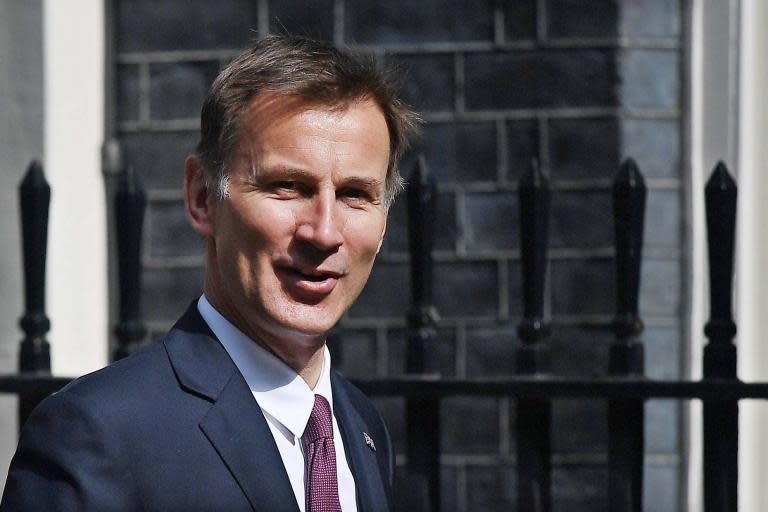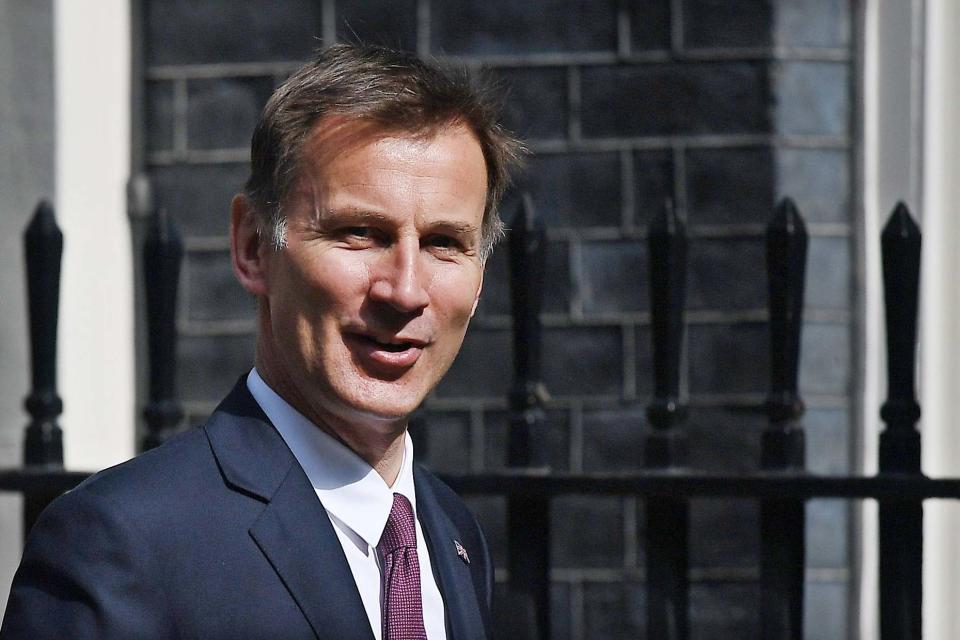Only I can out-run Boris to get a better deal with Brussels, says Jeremy Hunt
Jeremy Hunt today questions leadership frontrunner Boris Johnson’s suitability to renegotiate Brexit by telling the Evening Standard that “no one ever does a deal with someone they don’t trust”.
The Foreign Secretary says his personal reputation as well as his business skills mean he can deliver “better choices” for Britain than the “stark choice” offered by his rival for the Tory crown.
“Boris is a candidate who is offering really a stark choice between a no-deal Brexit and a general election,” he said.
“I think we can have a prime minister who can take those bad choices that we have at the moment and create better choices. That’s what a negotiator does.”
Mr Hunt, who is battling to be the second name on the ballot paper that will be put to the Tory membership, says he is “totally confident” that he can deliver an improved withdrawal agreement, based on his relationships with European leaders.
“I’ve not met a single European leader who doesn’t want to avoid no deal and if you put in front of them someone they are prepared to negotiate with, someone they trust — no one ever does a deal with someone they don’t trust — I am that person.”
Was he saying that EU leaders did not trust the runaway favourite to be Prime Minister?
“People can make their own judgment but I am the Foreign Secretary they have been talking to for the past year. They know that I can be tough. They know that I don’t blink. But they also know I am someone they can engage with.”
Mr Hunt has made much of his business background as a successful entrepreneur during the leadership race but he stresses his belief in the Tories’ “social as well as economic mission”.
He unveils a new policy to tackle the problem of rough sleeping and homelessness in London, which he calls a “sadness” for the capital city. “You walk around London, you see rough sleepers far too often,” he says. “They are a sign that our society has failed in a fundamental way.”
He is promising £30 million to copy successful projects in Manchester, Liverpool and the West Midlands, where charities can give a bed to a homeless person without the red tape of a housing assessment.
“Sometimes the bureaucracy gets in the way so we should sweep that aside,” says Mr Hunt.
For him it is both a moral and political imperative. “People need to see our values are not just about wealth creation but that we have a vision for everyone.”
Mr Hunt stresses that higher spending — and any future income tax cuts — are reliant on growing the economy. He pledges to continue “iron discipline” on public finances, including debt falling as a proportion of GDP.
Britain’s “big opportunity” is becoming “the world’s next Silicon Valley”, he says, with high-tech industries mushrooming. “Just as it’s now London and New York for financial centres, it really could be Silicon Valley and Britain for high-tech.”
Towards this end, he would speed up the rollout of superfast broadband to 2027, ensuring a “one gig connection for every home and business in London”. And while digging up the city streets to lay fibre-optic cables, he would put in a network of electric car charging points at a cost of £2.5 million “so we can move to an electric car only city and make London pollution-free”.
He is prepared to raise defence spending above the two per cent of GDP commitment to Nato. But the military will has to show it can deliver “extra capabilities” like cyber before it gets a penny, he said, because “MoD doesn’t have the best reputation in terms of its financial management”.
Mr Hunt knows the military well. His father, Sir Nicholas Hunt, was a Cold War warrior in the Royal Navy who rose to be Commander-in-Chief Fleet from 1985 to 1987. What did his dad teach him about leadership?
“My dad always believed that you should reach for the stars, but that leadership is about having the trust of the people you lead to represent their interests and values. And leadership is also about fundamental human decency.”
Did his family background make him more comfortable with the idea of having his finger on the nuclear button?
“I think I am very, very aware of the responsibilities involved,” he said. “Anybody who is from a military family knows that the last thing military people want is to have a war.
“The great lesson of the Cold War was that the best way to avoid war is through strength.”
To get to No 10, Mr Hunt must beat his rivals. He fires off some colourful salvoes. Of Rory Stewart he jibes: “Much as I respect Rory’s optimism, I think it is a little bit too optimistic to say that we can persuade the House of Commons to pass Theresa May’s deal.”
Of the similarities between his and Michael Gove’s positions on Brexit, he points out: “It is a difference of personality more than policy. I am someone who has experience of dealing with European governments and I think there is a sufficient relationship of trust … to negotiate a deal.”
In other words, the Environment Secretary lacks the experience and trust needed.
Was he disappointed or even cross that Health Secretary Matt Hancock went over to Boris? “I was a little surprised given that Matt wanted to take no deal off the table but, erm, everyone makes their own decisions,” he said, clearly dismayed.
Hunt later reveals that his police protection officers say he is a much better jogger than a certain Boris Johnson.
“Sometimes they come on bicycles,” boasted the minister whose trim waist and muscular thighs — the products of three or four runs a week of up to 10km — contrast with rivals Johnson and Gove.
With a mischievous grin, he purred: “Suffice to say they don’t tell me I am slower than the previous incumbent.”

 Yahoo News
Yahoo News 

